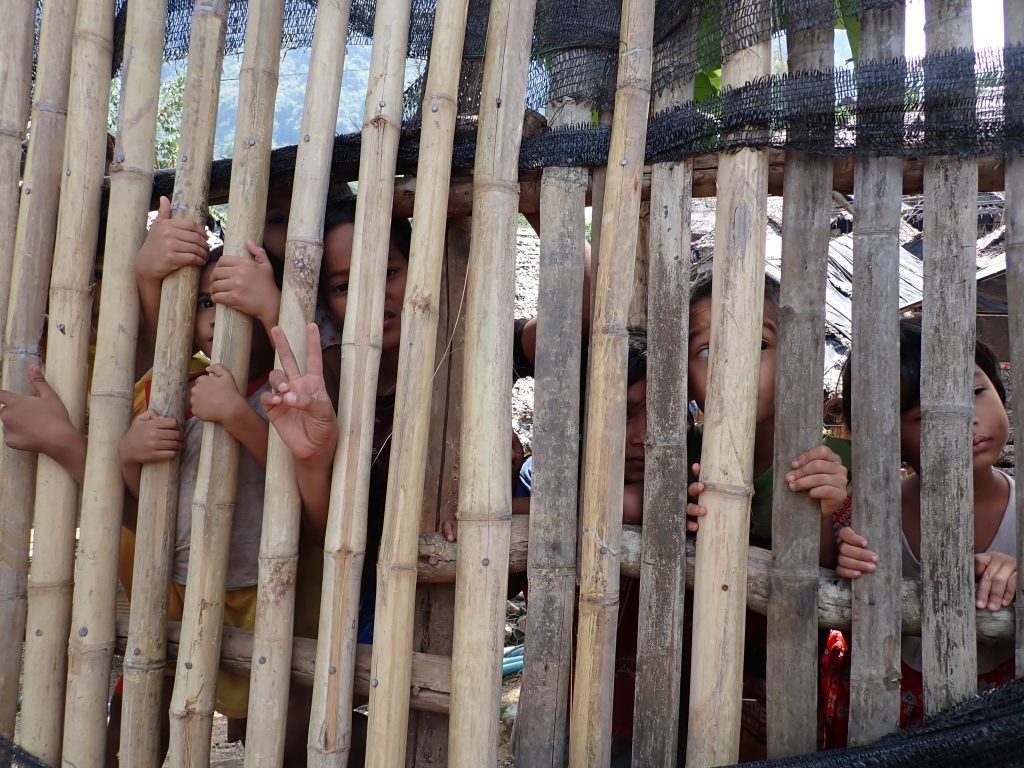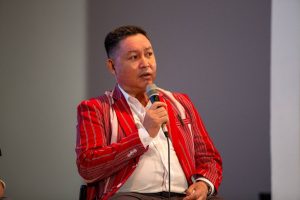The Men Fighting for Karen Rights in Thai Politics

MAY 2023 // Our team interviewed Manop Keereepuwadol (Move Forward Party) and Tip Ruchaitrakul (Thai Sang Thai), two men of Karen ethnicity who competed to become Member of Parliament during the most recent national elections in Thailand, in Chiang Mai and Mae Sot respectively.
Manop Keereepuwadol

The Karen man was born in Khun Pae, Chomthong district, Chiang Mai province. After two decades working as an environmental and indigenous rights activist, he took the opportunity to run for elections in 2019 under the banner of Future Forward. In May 2023, he campaigned for the new version of the party, ก้าวไกล moveforwardparty, with an agenda focused on decentralization, and won a seat in the Parliament.
People from indigenous rural backgrounds don’t have a chance to compete as candidates for the old traditional big parties because we don’t have the necessary money and connections. In 2019, we found an opportunity to participate meaningfully in the election process thanks to Future Forward, which came up with an ideology of equality for every human being and prioritizes vulnerable groups and minorities in the country.
But we had to overcome a lot of challenges because it was a very newly formed party. In the current campaign, the new version of the party became much more well-known and appreciated by rural remote communities, who gave us a warm welcome. We got a lot of individual donations from people who contributed to most of our campaigning budget, which is still far lower than the big traditional parties.
In Thailand, there are around six million indigenous people, that is around 10% of the total population. Among them, one million are from Karen ethnicity and 700 to 800,000 of them are registered as voters.
Our historical presence in Thailand can be traced back to 400 years, along the Salween and Mekong/Moei rivers. Our people have been mostly settled around Chiang Mai for 2 to 300 years. A lot of them managed to obtain Thai citizenship and our identity and culture have been better preserved and respected in Thailand than in Myanmar.
But the fundamental issue we face is centralisation. All decisions impacting us are made in Bangkok even though we have lived here for centuries. Our activities and our rights have forever been constrained by regulation created by another person who doesn’t have the slightest idea about our way of life. We don’t have control over our freedoms and finances and we live under the watchful eye of institutions based in the capital. Our people suffer from very limited access to education and infrastructure, such as electricity and roads.
Only people on the ground can design their own rights to this is why our party campaign for a Council of Indigenous People Act, access to land rights and the amendment of border treaties. Only a decentralized system can enable meaningful equality in a diverse society. We also try to promote the rights of indigenous people to both a regional and international level, up to the United Nations.
I have a lot of friends living in the nine IDP camps along the border since the 1990’s and the first exodus of Myanmar people to Thailand (see cover picture). For the people who were brought into the world in those camps, they are stateless, cannot go back to Myanmar but cannot function in Thai society because they are not recognized as refugees. So we plan to concede some status for them, where they would be considered as official residents in Thailand or at least work and go to school outside of the camps.
Regarding the terrible situation for our neighbors in Myanmar, our party chief has declared that if we manage to be part of a coalition government, we will address the issue of people who fled the war by supporting them instead of forcibly repatriating them, as well as set up a new negotiation mechanism to stop the Myanmar army’s brutality against its own people.
Tip Ruchaitrakul

During the May 2023 elections, Tip Ruchaitrakul was the Thai Sang Thai MP candidate for the districts of Mae Sot, Phop Phra and Umphang districts in Tak province. Despite his electoral defeat, the seasoned politician wants to defend the rights of his Karen community to have access to basic services and tackle official malpractices towards the most vulnerable.
“Ten years ago, I started my political career with Pheu Thai Party, for which I ran as a MP candidate and joined the Provincial Administrative Organisation. This year, I entered the Thai Sang Thai Party, which was founded in 2021 by former Pheu Thai people led by Sudarat Keyuraphan. I joined this new party because they defend a democratic ideology, focus on the defense of civil rights and people’s power and are not so extremist politically.
The election process is only half-democratic because the Prime Minister is chosen by 250 Senators who have been appointed by the military government. The Prime Minister should be voted in by the elected MP so our party has an agenda to erase the Constitution and rewrite one in a fully democratic way. The big guys need the small guys to get the power so we hope to win some seats in the Parliament and to be part of a democratic government coalition. Even if we are a small party, we have MP candidates in more than 300 constituencies and in every province.
In the last elections, Palang Pracharat won two seats and the Democrat Party one seat. The military used emergency powers to win and most of the sub-districts village headmen were forced to push people to vote for one of those parties. This time, no one is scared anymore because the MP came from the election, not straight up from a coup like in 2019. In the current election, I hope for some change in my constituency, I think that PP might get 1 or no seat and Bumjaithai might get one. I hope to get the third one. There is still more vote bank buying – 500 to 1000 THB per person – because they are desperate but people take the money and still vote for what they want.
My agenda is slightly different from my party’s national campaign. My campaign focuses on the Karen people’s rights. My ancestors come from Burma and I was born in a border village. The border was imposed by the British Empire and then the Thai government ,but actually this area is a Karen area on both sides, that is the state of Kawthoolei.
Our community is scattered all over Thailand, with the biggest number living in Chiang Mai, Tak and Mae Hong Son provinces. In the three districts of my constituency in Tak – Umphang, Pho Phra and Mae Sot – there are 32 000 eligible voters. 21 000 people voted at the last election so I calculated that with only 60% of Karen people voting for me, I can win without the support of other communities.
80% of Karen people live in forests and national parks. In those protected areas, the law forbids the construction of roads and other infrastructures so we have only dirt roads, and it makes it very difficult for people to buy land.
My campaign is about improving infrastructure and access to land rights by amending the law. The law must serve the people, not oppress them so we want to liberate our people by liberating the law first. The local government has the budget to build the roads but cannot do it because it needs to apply for a lengthy permission process at the Ministry of Environment. We cannot blame the officers because they have to follow the law, so my job is to be the representative of my people to rewrite the law.
My constituency sits at the Thai-Myanmar border, so people have many kinds of legal statuses. Our second challenge is to push for a new law to access citizenship for people who were not born from Thai parents or in Thailand but who have lived there most of their lives.
I have two of the nine old refugee camps in my constituency. If I become MP, I will propose that people living in those camps be allowed to access some personal identification papers so they can work, study, and enjoy basic human rights like health, education and safety.
Why are the local police able to arbitrarily bribe, detain and expel migrant workers? Do you think it would be possible to regulate this issue and how?
The bribery and corruption by the police are not so difficult to change. If the trading and transaction system becomes digitalized like in many Scandinavian countries, it can be controlled and monitored.
If you really want to fight corruption, you have to change the currency and financial system. You need to identify where the money comes from and trace the provenance of the bank notes. At the moment there is so much money in the underground system because it’s all happening in cash. I think that if anyone buys an item or property for more than 1 million THB, it has to be an official banking transfer. If things are regulated as such, police wouldn’t be able to take so many bribes anymore.
Bribery comes from an illegal system. Many construction business company owners complain that they have to pay bribes to the police and are pushed to break the law by failing to register their workers properly. A work permit is only valid in one province and attached to one employer. Workers would need different papers according to which sector they work in such as farms or factories but for now they all pay the same. So some employers pay illegal fees to the authorities because the process of providing work permits to their staff is so convoluted and expensive. This creates corruption as people take shortcuts on both sides. Thailand needs a labor force from other countries, so let’s manage it together.
Does your party have a policy towards facilitating and regulating the process of getting documentation for foreign people in Thailand? What about its stance on the Myanmar conflict and the complicity of the current government with the military regime in Myanmar?
My constituency is very mixed, some rich people and then also very poor, some full Thai, some Karen who have been here most of their lives, some Burmese with or without paper. Our group of people is very complicated in terms of religion, economy, culture, ethnicity, so we need special management in the five districts of Tak province.
We need certain arrangements and new documents according to which workforce category, for people who don’t have Thai ID, for the people in refugee camps, for migrant workers. We will push for an easier process for them to get ID or some documents to help them to have access to services. It’s an administrative process so we might not have to pass by the Parliament.
Mae Sot is part of a dedicated Special Economic Zone (SEZ). What do you think? Is it successful after the halt of Covid-19 and the reopening of the Friendship Bridge? Do you think it will be a good change for Mae Sot people, especially migrant workers?
Mae Sot was declared as a SEZ ten years ago but nothing happened and the jungle took over, but it is the town of Mae Sot which has become a huge transit area. Thai people need to think carefully about labor intensive industry and switch to technology because on the Burma side, they can also do it with cheaper labor.
We are a big district with big trade and some rich people are laundering money by buying land here. There is a lot of money being passed on under the table, grey money, black money, white money.
With the development of Shwe Kokko / Myawaddy, many young Chinese work in an illegal or legal way on the Burma side in the online gambling, call centers, and casino industry. I don’t know who could regulate that, it’s not easy on our level so we need to wait for the legal or political opportunity.
As a small party, I can’t be involved with this big stuff so I focus on improving life for my Karen people. They are the least fortunate people in our area and mostly live in the forest so we need to change laws so they can access infrastructures and land.
Mae Sot is also a place where the majority of Burmese migrant workers live. They are also facing labor rights violations in the workplace. Tell us how you and your party will deal with these.
We don’t have specific proposals on these issues, but I think it’s very sensitive in Mae Sot with many members of the Civil Disobedience Movement (CDM) and People Defence Forces (PDF) along the border. But it is not a Thai people problem so our party sticks to offering pensions for old people and free study until bachelor degree.